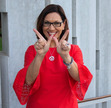Tiddas from the page to the stage… a new writing journey
[image error]
With Sanja Simic and Nadine McDonald-Dowd as the journey began, January 2020.
I am now six months into my La Boite Theatre Company Artist in Residence, working on the adaption of my novel Tiddas for the stage. Many of you will remember the band the Tiddas who were a popular acapella band from 1990-2000. Tiddas is a term used nationally for your closest girlfriend, your BFF, your sistagirl. You can call your mother, daughter or aunt tidda as well. It’s an endearing, loving term for a woman who is special to you.
[image error]
For example, Sanja Simic, my Creative Producer from La Boite (pictured above), became a tidda of mine within literally minutes of our first meeting late in 2019. Sometimes we just click with like-minded, equally passionate creatives. Have you ever experienced that too?
[image error]
I am so incredibly lucky to be working with dramaturg Nadine McDonald-Dowd (pictured above), Executive Producer at QPAC (and tidda of 19 years). Together we are on bringing to life the values and experiences of my Wiradjuri characters and their non-Indigenous friends from Mudgee, who over the course of their early 20s find themselves blanketed in jacaranda trees in Brisbane. Nadine has an energy I’ve never experienced before, and her enthusiasm for this project is infectious.
[image error]
Writing “TIDDAS the play” is a significant moment in my writing journey, which has been inspired by strong, phenomenal women including the late Oodgeroo Noonuccal (We Are Going, 1064), Ruby Langford-Ginibi , (Don’t Take Your Love to Town, 1988) and of course, Doris Pilkington Garimara who’s Follow the Rabbit Proof Fence (UQP, 1996) was turned into the film Rabbit Proof Fence in 2001, opening up the stories of the Stolen Generations to an international audience. All of these extraordinary Aboriginal women left significant legacies, for all, but they especially influenced me and my writing.
[image error]
Thank you to Justine Clarke, Shari Sebbens, Colin Kincella and Kylie Bracknell for being reading the first draft of TIDDAS via zoom last week.
To me, TIDDAS the play is about more than friendship, it is about considering the challenges of contemporary sistahood. It explores the emotional, personal, and professional journeys of five women, best friends for decades, who meet once a month to talk about books … and life, family, careers and the messy bits in between. Together they dissect each other’s lives and loves, and in doing so they are brutally honest, and so the challenge is how to keep their love unconditional and their friendships intact. And as we see through their experiences, and as we know ourselves in real life, it isn’t always easy.
I need to stress that TIDDAS is not autobiographical – but of course as writers we bring something of ourselves to the page through dialogue through our character’s personalities and so forth. My hope is that women who read the novel and who see the play, connect with one or more of the characters, that they see themselves in both strengths and the flaws of the women I’ve portrayed.
[image error]
Thank you to Veronica Neave, Chenoa Deema and Shakira Clanton for the second reading of the play last week.
So, who are the tiddas, and who do you relate to?
Veronica, recently divorced and dedicated to raising the best sons in the world, has lost her own sense of identity and has no self-esteem. She lives in The Gap and is a proud Reconciliationist, and hates conflict.
Izzy lives in West End and is soon to be the first Black woman with her own television show, but she has to make a decision that will change everything. Okay, this is not autobiographical, but I did want to be Australia’s Oprah a few years ago.
Xanthe lives in Paddington, has a Greek father and Wiradjuri mother. She is an entrepreneur, desperate for a baby, and can think of nothing else, even at the expense of her marriage.Ellen lives in Kangaroo Point, she is footloose by choice, and after a period of reno-dating (dating her renovators), she begins to question all that she’s fought for.
Nadine lives in Upper Brookfield, is non-Indigenous and married to Izzy’s brother, and so successful at writing other people’s stories, she is determined to blot out her own. She is an alcoholic, because Aboriginal people do not have the monolopy on substance abuse.
[image error]
I am truly excited about being able to bring these characters, their lives and their friendships to life on stage, because I want to see theatre with Aboriginal women as strong, sassy, educated, intelligent, capable, funny and entertaining women. Not just women as survivors of trauma, but women in control of our destinies, with our own dreams and aspirations. Women who are driving forces in the arts, in education, in business and the community at large. I feel like the stories of those woman get lost in the often-voyeuristic representations of Aboriginal people as victims. I want TIDDAS the play to redress that imbalance.
And to be able to work on alongside and learn from the extraordinary women like my Nadine and Sanja, is both a privilege and honour. But it is also quite daunting. They are at the top of their fields, and I am not yet even on the field. Both women are incredibly generous of spirit and gentle in their feedback when they hear a quiver in my voice that may at times suggest that I do not take constructive feedback that well – this is not true. I love the editorial process but it is different in theatre. In publishing the feedback is on the page, in theatre the feedback is to your face, on the spot. Whoa!
But most of all I love being part of a powerful team of women who can contribute something together to the Australian cultural landscape. And that is something to be incredibly grateful for.
[image error]



